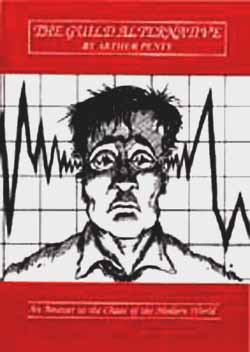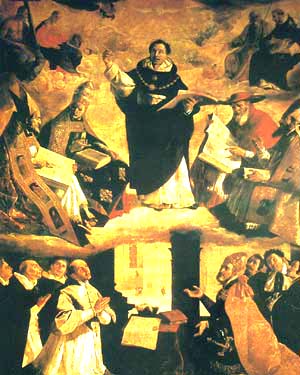 |
Socio-Political Issues
On Common Property:
Arthur Penty vs. St. Thomas Aquinas
Patrick Odou
I would like to analyze a doctrinal point whereby Arthur Penty’s position regarding common property opposes that of St. Thomas. Penty (1875-1937) was a British writer on Guild Socialism and Distributism [click here]. He was first a Fabian socialist and then a partisan of “Christian Socialism.” Penty's socialist notion of common property is expressive of Distributism, which insistently is being promoted in certain Catholic circles. It is, therefore, important to show how a major fundament of this system clashes with the traditional Thomistic teaching of the Church.

Books by Penty attack Capitalism supposedly based on Christian principles. But his interpretation of Christian principles contradicts the teaching of St. Thomas. |
There are two passages from the Act of the Apostles that discuss common property and the life of the early Christians in Jerusalem. These two passages are the basis for important conclusions held by Penty and other leaders of Distributism regarding the adoption of common property by a future society. The texts are the following:
• “And fear came upon every soul: many wonders also and signs were done by the apostles in Jerusalem, and there was great fear in all. And all they that believed, were together, and had all things common. Their possessions and goods they sold, and divided them to all, according as every one had need.” (Acts 2:43-45)
• “And the multitude of believers had but one heart and one soul: neither did any one say that aught of the things which he possessed, was his own; but all things were common unto them. And with great power did the apostles give testimony of the resurrection of Jesus Christ our Lord; and great grace was in them all. For neither was there any one needy among them. For as many as were owners of lands or houses, sold them, and brought the price of the things they sold, and laid it down before the feet of the apostles. And distribution was made to every one, according as he had need. And Joseph, who, by the apostles, was surnamed Barnabas, (which is, by interpretation, The son of consolation,) a Levite, a Cyprian born, having land, sold it, and brought the price, and laid it at the feet of the apostles.” (Acts 4:32-37)
Penty induces an egalitarian principle from these texts, and also concludes against the legitimacy of private gain. He says:
“Looking at Christianity in the light of these texts, we find ourselves in the presence of a creed whose aim it was to promote communal relationships in society, for it is manifest that in the mind of the Early Christians the Fatherhood of God involved the Brotherhood of man, and vice versa. If men and women were to live together as equals, if they were to share a common life and hold goods in common, they must have in common ideas as well as goods, or there would be no cement to bind them together. In order that common ideas might prevail amongst them, they must acknowledge some supreme authority, some principle of conduct which was above and beyond personal opinion. Above all, they must be fortified in spirit against any temptation to private gain” (A Guildsman’s Interpretation of History by Arthur Penty, p. 35).
This idea is repeated many times in Penty’s work in order to justify that this precedent of the Apostles establishes a rule for authentic Catholic societies. (Ibid. pp.34, 36, 37, 152, 155, 156… and many more).
However, St. Thomas Aquinas taught something quite different concerning these passages. Unlike Penty’s egalitarian interpretation, St. Thomas presented a practical reason as to why the first Christians sold their goods and held all things in common.

The Apotheosis of St. Thomas Aquinas by Zurbanan |
He said that the system of selling properties and holding the proceeds and all things in common is necessarily a temporary measure; it cannot last for a long time. He stated that the Apostles had foreseen by a grace of the Holy Ghost that the Church in Jerusalem would be persecuted and the city itself would be destroyed. Only this prophetic premonition would explain such a provisory measure. He confirmed his argument demonstrating that the Apostles never again applied this system after leaving Jerusalem because they wanted to found stable communities in the early Church.
St. Thomas dealt with this topic while discussing the different ways one can practice voluntary poverty.
“The first way of so living is for each person to sell his possessions, and for all to live in common on the proceeds. This appears to have been the practice under the Apostles in Jerusalem, for it is said: 'As many as were owners of lands or houses sold them and brought the price of the things they sold, and laid it down before the feet of the Apostles. And distribution was made to every one as he had need' (Acts 4:34-35). But it does not seem that effective provision is made for human life, according to this way" (Summa contra Gentiles, Book 3, Part 2, chap. 132, 2, trans. by Vernon Bourke, Garden City, New York: Image Books, 1956, p. 170).
Then St. Thomas, answering objections, explained that the system of living from the proceeds of selling properties is necessarily an unstable situation. For any society to last, it needs a different and more stable system of life. He stated this quite clearly:
“Now, the first way, that is, for all to live in common on the proceeds of possessions that are sold, is one which will work, but not for a long time. So, the Apostles instituted this way of living for the faithful in Jerusalem, because they foresaw through the Holy Spirit that they would not remain together for long in Jerusalem, both because of the persecutions to come from the Jews and because of the imminent destruction of the city and its people. As a result, it was not necessary to provide for the faithful, except for a short time. Consequently, when they went out to other peoples, among whom the Church was to be established and to continue to endure, there is no account of their establishing this mode of living” (Ibid. chap. 135, 2, p. 182).
So, unlike Penty, St. Thomas Aquinas did not read any Communist, Socialist or Distributist philosophy into these passages. He merely presented a practical, sensible, and reasonable explanation as to why the early Christians in Jerusalem sold everything and presented the proceeds to be used in common. They knew that there would be no future in that city and that they would soon be leaving. There was no point in anyone owning or developing anything in such a location. In other words, this was an extraordinary situation that cannot serve as a model for any normal society.
The conclusion is simple. Penty is completely wrong in his interpretation of these passages of the Acts of the Apostles. His philosophical and social elaborations have no foundation in reality. It seems that as long as these false ideas and interpretations of Penty – who was vice-president of the Distributist League – are expressive of Distributism, their falsehood extends to the entire movement.

Posted January 3, 2006

Related Topics of Interest
 Why Are Distributist Leaders Misleading Their Audience About Capitalism? Why Are Distributist Leaders Misleading Their Audience About Capitalism?
 A Distributist Manifesto Strongly Spiced With Communism A Distributist Manifesto Strongly Spiced With Communism
 Socialism and Distributism in Catholic Clothing Socialism and Distributism in Catholic Clothing
 Eric Gill, a Precursor of Vatican II Eric Gill, a Precursor of Vatican II
 Eric Gill: the Pedophile Founder of Distributism Eric Gill: the Pedophile Founder of Distributism
 Other Moral Pearls of Eric Gill Other Moral Pearls of Eric Gill
 A Torrent of Pros and Cons on Eric Gill, a Founder of Distributism A Torrent of Pros and Cons on Eric Gill, a Founder of Distributism

|
Social-Political | Hot Topics | Home | Books | CDs | Search | Contact Us | Donate

© 2002- Tradition in Action, Inc. All Rights
Reserved
|
 |
|